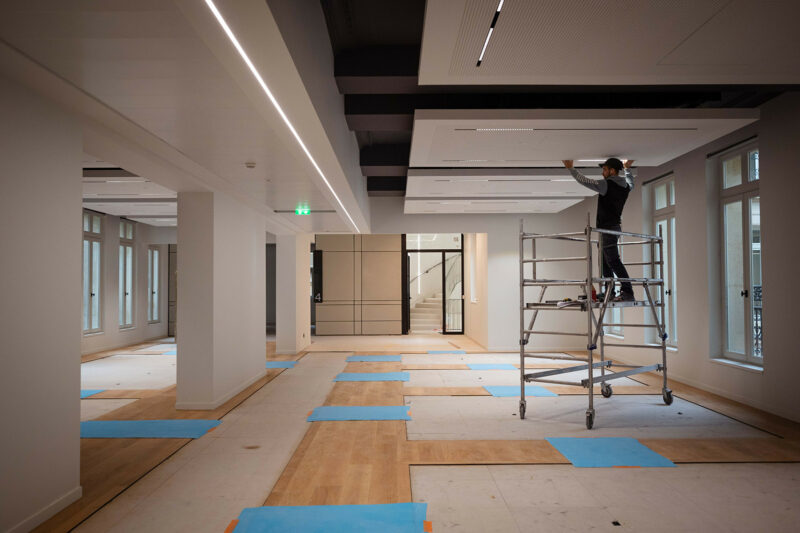
The innovative ventilation technology developed by Halton and Phononic was inaugurated yesterday in the Pierre Charron luxury property in the center of Paris. This is the first public project where TTAP technology (Terminal Treatment of Air with Peltier) has been installed. It is also the first time a semiconductor-based heating and cooling system has been implemented in an entire property.
“Pierre Charron is a magnificent place to celebrate this historic moment. We have an entirely new HVAC technology that helps property owners meet increasingly stringent climate goals,” says Anu Saxén, Managing Director at Halton Oy.
TTAP reduces the energy consumption of the property by about 15 percent compared to traditional HVAC systems. The carbon footprint is reduced by the same amount.
Built in 1877, Pierre Charron is located in the heart of Paris, about 50 meters from the famous Champs Élysées. The property has approximately 8,500 square meters of offices and commercial spaces. TTAP-based ventilation devices were installed during the renovation.
“We wanted to provide our tenants with comfortable and environmentally sustainable spaces. TTAP technology is an ideal solution for our purpose,” says Francois Menage, CEO of Balzac, the property company that owns the building.
TTAP technology is based on so-called Peltier cells. When current is applied to the semiconductor-made cell, one side heats up, and the other cools down. This thermoelectronic phenomenon is used for temperature control in electronics and small coolers. Halton and Phononic are the first in the world to bring it into a large-scale HVAC system.
The device manages ventilation, cooling, and heating for the space. Terminal devices containing Peltier cells circulate room air with their own fans, causing the room air to either cool or warm. Fresh air from the ventilation unit flows into the space through the device.
“Cooling and heating often consume over 40 percent of the energy in commercial buildings, so the industry is actively exploring ways to reduce energy consumption and carbon emissions. The announcement of the first TTAP project is a truly exciting moment for us,” says Tony Atti, CEO of Phononic.
The ventilation system based on TTAP technology becomes about 20 percent more cost-effective than traditional HVAC systems over the building’s lifecycle. Savings are achieved, among other things, by not having cooling water networks, and water chillers are smaller. Maintenance needs decrease with fewer moving parts.
“The technology has generated a lot of interest. We are eagerly looking forward to showcasing Pierre Charron’s solutions to customers. New TTAP projects are underway, including on the U.S. East Coast,” Anu Saxén adds.
Interest is further fueled by the fact that TTAP technology makes buildings low-carbon, and at the same time, their maintenance becomes more affordable. Both factors increase the value of properties.
Halton and Phononic announced a licensing agreement in September, enabling the introduction of TTAP technology to the market. The collaboration aims to combine Halton’s expertise in energy-efficient, health-promoting indoor climates with Phononic’s semiconductor technology.
Read more about Halton TTAP TP1 unit
Additional Information: Anu Saxén Director, SBA Halton +358 (0)40 501 6209 anu.saxen@halton.com
Halton Group is a global technology leader providing indoor air solutions for challenging public, work, and business spaces, healthcare facilities, laboratories, professional kitchens, offshore sites, as well as energy production and industrial environments. Halton’s goal is to offer end-users safe, comfortable, and productive indoor environments that are also energy-efficient and in line with sustainable development principles. The company was founded in Finland in 1969. Today, Halton Group employs over 1,900 people in nearly 40 countries. The company’s turnover in 2022 was 290 million USD (Eur 270 million). www.halton.com
Phononic is the world’s leading manufacturer of sustainable semiconductor-based cooling solutions. Its technology reduces greenhouse gases while meeting market performance requirements. The company’s thermoelectric devices and integrated products are critical for human work and communication. They help cars see, secure the storage and transportation of medicines and vaccines, support the cold chain of food products, and cool residential and workspaces. www.phononic.com


